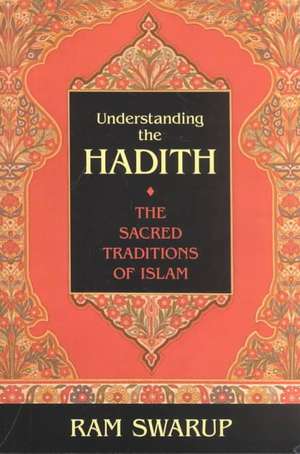Understanding the Hadith
Autor Ram Swarupen Limba Engleză Paperback – 31 aug 2002
Swarup is plainly skeptical of the claim that the Hadith literature is divinely inspired. In the introduction he says, "The Prophet is caught as it were in the ordinary acts of his life - sleeping, eating, mating, praying, hating, dispensing justice, planning expeditions and revenge against his enemies. The picture that emerges is hardly flattering. . . . One is . . . left to wonder how the believers, generation after generation, could have found this story so inspiring. The answer is that the believers are conditioned to look at the whole thing through the eyes of faith. To them morality derives from the Prophet's actions. . . .his actions determine and define morality."
The Sahih Muslim, a massive work consisting of 7,190 traditions divided into 1,243 chapters, is hardly accessible to the average reader; so Swarup quotes representative selections that touch upon the main tenets of Islam: faith, purification, prayer, fasting, pilgrimage, marriage and divorce, crime and punishment, religious wars (jihad), paradise, hell, repentance, and many other features of the religion.
To non-Muslims this work provides many insights into the mindset of the average Muslim who is raised on these traditions about Muhammad. It also underscores the gulf that exists between the sanctum of orthodox Islam and an increasingly secularized Westernized world.
Preț: 145.32 lei
Nou
Puncte Express: 218
Preț estimativ în valută:
27.81€ • 29.74$ • 23.18£
27.81€ • 29.74$ • 23.18£
Carte disponibilă
Livrare economică 27 martie-10 aprilie
Preluare comenzi: 021 569.72.76
Specificații
ISBN-13: 9781591020172
ISBN-10: 1591020174
Pagini: 273
Dimensiuni: 140 x 212 x 20 mm
Greutate: 0.3 kg
Editura: Prometheus Books
ISBN-10: 1591020174
Pagini: 273
Dimensiuni: 140 x 212 x 20 mm
Greutate: 0.3 kg
Editura: Prometheus Books
Notă biografică
Ram Swarup was one of India's leading intellectuals and a distinguished representative of renascent Hinduism. He wrote on many topics, not only comparative religion but on Gandhian economics, Maoism, and communism.
